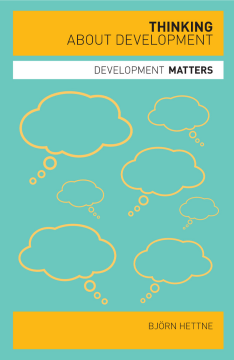
Additional Information
Book Details
Abstract
This book is a concise and accessible introduction to development thinking, contemporary development theory and practice and - a critical analysis of the values that lie behind them. Hettne argues that schools of development thinking should be historically contextualized, not presented as evolving towards a universal theory. The book will present development as an 'essentially contested concept', that has meant a number of things at various times to different people in different places. Focusing on historical discourses from the initial colonial encounters through to the modern day, Hettne draws the connections between the enlightenment belief in 'progress' through to the more recent focus on the Millennium Development Goals. The first volume in the 'Development Matters' series this book provides the key frame for the series as a whole, enabling readers to locate texts on themes such as environmental justice, technology and development learning within a broader historical, conceptual and political context than the immediate policy and output needs of neoliberalism.
Bjorn Hettne is Professor Emeritus of Peace and Development Studies at Gothenburg University. His main research has been in India, and he has written a large number of books and articles on development theory, global regionalism, international relations, the development-security nexus, as well as Europe and the world order.
'This scholarly yet accessible and clearly-written book should be read by everyone with an interest in current global issues. Rescuing critical development thinking from the 'cul de sac' of the post-developmentalists, Hettne argues that a concept of global development remains central to the rethinking and restucturing of international relationships if we are to engage fully with the demands of an emerging multipolar world order.'
David Lewis, London School of Economics and Political Science
'Thinking about Development is a clear and concise introduction to the idea of development from one of the most established scholars in the field. Looking at past and present Hettne forces us to think about possible future scenarios. This is essential reading for those new to development thinking and practice as well as a great refresher for those who feel disconnected from the bigger picture that global development represents.'
Jelke Boesten, University of Leeds
'Bjorne Hettne's timely and compelling book puts development into a much needed historical perspective with a forceful and convincing interpretation of development in the past and in today's global era. A must read for all development scholars and practitioners who take seriously the need to bring the insights of development studies to what Hettne rightly argues is required today - new global social theory.'
Wendy Harcourt Editor of 'Development'
Table of Contents
| Section Title | Page | Action | Price |
|---|---|---|---|
| Prelims\r | ii | ||
| About the series | ii | ||
| About the author | ii | ||
| Preface | vi | ||
| INTRODUCTION | Development Studies and Development Thinking | 1 | ||
| 1 | Theoretical Framework | 8 | ||
| Development and history | 8 | ||
| Modernity | 11 | ||
| Development and values | 13 | ||
| Development and security | 19 | ||
| 2 | The ‘Original Transition’ | 24 | ||
| Traditional society | 25 | ||
| Rise of Westphalia | 28 | ||
| The first nation-state | 29 | ||
| Contested ‘transitions’ | 30 | ||
| 3 | The Pursuit of Freedom | 35 | ||
| Origins of the liberal creed | 36 | ||
| The Marquis de Condorcet | 37 | ||
| Enlightened development | 40 | ||
| A discursive struggle | 42 | ||
| 4 | The Modernization Imperative | 45 | ||
| Industrialize or perish! | 47 | ||
| Theory and ideology of capitalism | 49 | ||
| The Communist Manifesto | 52 | ||
| Theories of imperialism | 54 | ||
| Doubts about development | 55 | ||
| Marxism and populism | 56 | ||
| 5 | Planning in ‘Dark Times’ | 58 | ||
| Development problems | 59 | ||
| Development in a totalitarian age | 61 | ||
| The Soviet model | 62 | ||
| Hitler and Stalin | 64 | ||
| Keynes, the free-trade sceptic | 65 | ||
| Crisis of modernity | 66 | ||
| 6 | The Geopolitics of Poverty | 69 | ||
| Thinking about world order | 70 | ||
| Development and bipolarity | 73 | ||
| Birth of development studies | 78 | ||
| Rostow’s model as development ideology | 80 | ||
| Alternative theory | 83 | ||
| 7 | Globalization and Disorder | 85 | ||
| Development and globalism | 86 | ||
| What is globalization? | 88 | ||
| Neo-liberalism vs neo-conservatism | 93 | ||
| The politics of identity | 94 | ||
| Restoring order | 98 | ||
| 8 | In Search of Global Development | 102 | ||
| Global challenges | 103 | ||
| Interventions and global governance | 105 | ||
| Global governance | 107 | ||
| US foreign policy | 109 | ||
| The Beijing Consensus | 115 | ||
| Global development | 116 | ||
| The Millennium Declaration values | 122 | ||
| CONCLUSION | Towards Global Social Theory? | 124 | ||
| Notes | 136 | ||
| Recommended Reading | 138 | ||
| Index | 145 |
